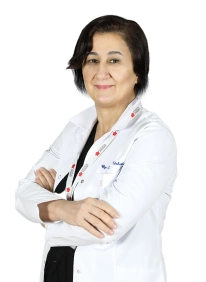IVF UNIT
What is In Vitro Fertilization?
In vitro fertilization is the process of combining the mother's egg cells with sperm samples taken from the father in an artificial environment outside the uterus and placing them back in the mother's uterus. In this way, it helps people with fertility problems have a baby.
During the IVF process, each patient is special and a treatment plan is prepared specific to the patient’s background.
We apply modern reproductive treatment options to our partners who want to have children, in accordance with patient rights and privacy, by minimizing the financial and moral burden.
What is In Vitro Fertilization Treatment?
IVF treatment is the assisted reproductive technique preferred by couples who cannot have children in natural ways. There are many methods used in IVF treatment. It depends which of these will be more effective on the reason why the couple cannot have children. Treatment methods provided in our center are ovulation induction, intrauterine insemination (IUI), in vitro fertilization (IVF), intra cytoplasmic sperm injection (ICSI), embryo freezing, sperm freezing, oocyte (egg) freezing and sperm search by surgical methods. (TESA - TESE)
Our IVF center has been serving since 2007 with its expert team. In our IVF treatment center, we have been working successfully for many years on ensuring that our couples who apply from both our country and abroad have children, egg freezing for single women with decreased egg reserve and reaching advanced age, and freezing and storing eggs and sperm in patients who need chemotherapy treatment.
Our primary goal is to make our patients comfortable and feel special during the vitro fertilization treatment, at Çakmak Erdem Hospital.
Fill out the form to be informed in detail about free examination, IVF prices and treatment, and we will contact you immediately.
Who Could Have Vitro Fertilization Treatment?
In vitro fertilization treatment is applied to couples who have had regular unprotected intercourse for 1 year but pregnancy could not develop.
When is IVF treatment required:
- If you are below 35 and you can’t get pregnant after one year of unprotected sex
- If you are over 35 and you can’t get pregnant six months after having unprotected sex
- If you are over 40 and want to have babies
- If your sperm counts are low and if you have testicle and prostate diseases.
Other conditions when the treatment is required:
- Ovulation disorders such as polycystic ovary
- Obstruction of the tubes or ectopic pregnancy, removal of tubes due to infection, etc.
- Genetic factors
- Failure to ensure the connection between the tubes and ovaries due to intra-abdominal adhesions
- Vaginismus and ejaculation problems
- Absence of sperms in semen analysis
- Problems in sperm ducts
- Unexplained infertility
- Endometriosis
What is Infertility?
Infertility problem, which is very common in the world, is seen in approximately one out of six couples. Infertility is the situation where the woman cannot get pregnant despite having unprotected intercourse for 1 year. For the diagnosis, examination of both the couples, accurate and complete history should be taken and the necessary examinations should be done completely. In some cases, the reason of infertility cannot be explained even though all kinds of researches are made. This is called "unexplained infertility". 10% of the infertile couples are in this category. With the modern infertility treatments, the success rate in infertility phenomena is increased.
In primary infertility phenomena, no pregnancy has been achieved. In secondary infertility phenomena, no pregnancy has been achieved following the birth of one or more children.
One-third of infertility cases are caused by male reproductive issues, one-third by female reproductive issues, and one-third by both male and female reproductive issues.
Causes of Infertility in Women
- Age
- Difficulty in egg release and unhealthy eggs
- Excessive use of alcohol or cigarettes
- Excessive weight gain and loss
- Intense physical or mental stress
- Multiple miscarriages
- Obstructed tubes
Causes of Infertility in Men
- Decreased sperm quality or number
- Excessive use of alcohol or cigarettes
- Enlarged testicular veins
- Increased temperature in the testicles disrupts sperm shape
- Health problems such as diabetes, inflammation
What are the Stages of IVF Treatment?
There are 5 stages of IVF treatment, which is planned in accordance with the ages, eggs capacity, etc. of the couples, applying to our IVF center.
These are:
1. First interview
In the first interview, the situations that cause infertility are explained to the couples and necessary analyzes are made to identify the problem. If couples have previously had these tests, they are asked to bring these test results with them. By comparing the results, it is decided which treatment method will be applied.
2. Stimulation of the ovaries
In the second stage, on the second or third day of the menstrual period, the ovaries are examined with ultrasound evaluation. If necessary, the patient's hormone levels are checked. Depending on the results, in vitro fertilization drugs can be started to stimulate the ovaries.
3. Egg collection
In this process, which is one of the most important stages of the treatment, when the egg reaches the desired size after the administration of hormone drugs, fluid-filled structures called follicles inside the eggs are discharged and the egg cells are collected contained in this fluid. (As this procedure may cause some pain, it is performed using general anesthesia in the gynecological examination position). Fertilization is achieved by combining the egg cells taken from the woman and the sperm samples taken from the man. Another important point is that when separating the sperm cells from the men, the most quality sperms are collected. This process can be performed with the help of a microscope in a laboratory environment, or by microchip technology
4. Embryo transfer
IVF transfer process is carried out 2-6 days after egg collection. Since it is a painless procedure, anesthesia is not used. Multiple pregnancies may occur if the transfer is applied more than once. After the cervix is cleaned, the embryos are placed in the catheter and directed into the uterus under ultrasound. If necessary, hormone medications may also be administered to support the process.
5. Test stage
After IVF transfer, the result can be seen through the pregnancy test 14 days later. If the test result is positive, the baby's heartbeat can be observed by ultrasound examination after 3 weeks. In case of pregnancy, IVF treatment ends.
Treatment Options at IVF Center
Ovulation Induction: It is a drug treatment used to increase egg development.
- Intrauterine Insemination (IUI) (Vaccination): It is the process of injecting the sperm prepared by passing through special stages in the laboratory environment during the ovulation period of the woman, into the uterus of the expectant mother through a special catheter. After ovulation occurs in women, a cracking injection is made. After 36-48 hours, the sperm taken from the man is subjected to special processes. IUI (vaccination) is a procedure that does not require anesthesia and can be performed in office conditions. The sperm sample is introduced into the uterus with a thin catheter. In order to carry out such treatment, the woman's fallopian tubes must be open. There should be enough number of sperms. Sperm count and morphology are so significant. IUI should not be performed if the sperm count is below 10 million/ml. In addition, if the sperm morphology is 4% and below according to the Kruger criteria, IVF is preferred the more. In vitro fertilization treatment is preferred especially in cases of unexplained infertility, and it has been demonstrated that repeating the procedure more than 4 times does not increase the chance of pregnancy. After the vaccination process, the couples can continue their daily activities.
- In Vitro Fertilization (IVF): It is the classic IVF procedure. One or more egg cells are combined with the sperm outside the body. After it is fertilized and turns into a fetus, it is placed in the expectant mother’s womb.
- Intra Citoplasmic Sperm Injection (ICSI): Sperm is injected into one or multiple egg cells, and when it is fertilized and becomes a fetus, it is placed in the uterus of the expectant mother.
- Embryo Freezing: Embryos are frozen and stored in special tanks for future use.
- Sperm Freezing: The sperm of men who will receive chemotherapy treatment and whose sperm reserve is gradually decreasing are stored by freezing.
- Oocyte (Egg) Freezing: The eggs of women with reduced egg reserve (confirmed by tests) and who will undergo chemotherapy treatment are stored by freezing.
- Sperm Search with Surgical Methods (TESA - TESE): Men who do not have sperm in their semen (azoospermia) are searched for sperm in their testicles through a needle or surgery.
FREQUENTLY ASKED QUESTIONS
Until What Age Can Women Have IVF Treatment?
By aging, there is a decrease in the ovarian reserves of women. Therefore, aging affects the chances of getting pregnant. In vitro fertilization treatment can be started by checking the hormone tests performed on the 3rd day of menstruation and the ovarian capacity by ultrasound and whether the ovarian functions are sufficient. As a result of all these applications, IVF treatment is carried out until the age of 45.
How Should Patient Feed in IVF Treatment?
Couples who want to become parents should pay attention to their nutritional habits before and during IVF treatment. In order to increase IVF success rates, it will be beneficial to be at an ideal weight, consume plenty of fluids, increase the consumption of legumes and fish, quit smoking, consume foods rich in folic acid and use sweeteners instead of sugar. For more detailed information, counseling can be obtained from a dietitian during this process.
Does Having Fibroids Reduce the Chances of Pregnancy?
First of all, it is necessary describe the fibroid. Fibroid is a benign tumor originating from smooth muscle cells of the uterus. Fibroids, which are frequently encountered especially in women over the age of 35, can prevent the embryo from adhering to the intrauterine cavity and cause miscarriage or premature birth. Uterine ultrasonography is sufficient to detect myoma.
How Long Does IVF Treatment Last?
Nowadays, faster protocols should be applied. The treatment is completed in about 15 days after menstruation. Ovarian stimulation begins on the 2nd or 3rd day of menstruation. Eggs are collected at the end of a treatment for 8-10 days and the embriyo transfer is performed. In longer protocols, preparations are made starting from the previous month, this is a 30-45 day process. We apply short protocols to more than 90% of our patients who apply to our hospital.
How Much Does IVF Treatment Cost?
The cost of IVF varies according to the treatment process. In accordance with the law, information is not provided about IVF prices on the website. In our center, patients are informed in detail about payment before starting treatment.
Does Insurance Cover IVF Treatment
Yes. We have an agreement with SSI for IVF treatments at Çakmak Erdem Hospital. By the delegation received from SSI, IVF prices are significantly reduced. You can learn the terms of the SSI Committee Report on the SSI website.
Is There a High Chance of Miscarriage After IVF?
The possibility of miscarriage in pregnancies with the IVF method is slightly higher than those with the normal method. However, the difference is not that much. Miscarriage problems after IVF are generally caused by the same reasons with the natural conception.
For more information and to learn about IVF prices, you can call 0505 959 29 59 or make an IVF examination appointment via whatsapp.


